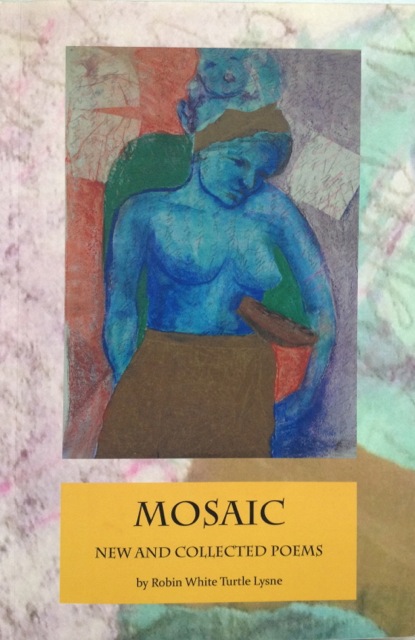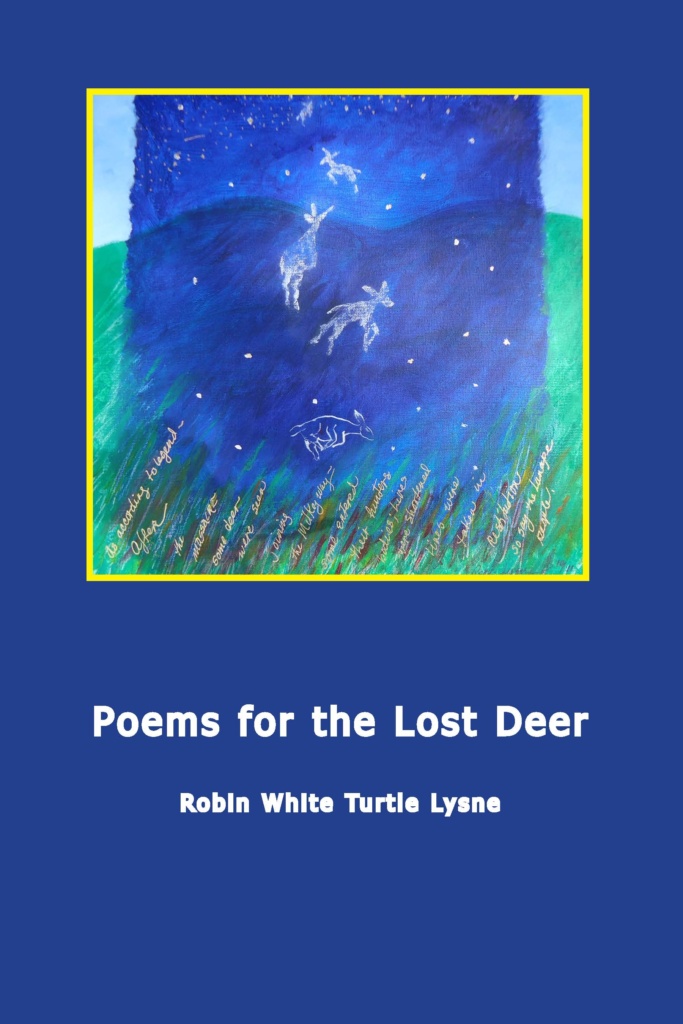Welcome to my poetry page. Enjoy the poems, and if you would like more, order a book! My two publications are shown below. I also have been included in magazines, and anthologies which you will see below the books. I also have some performances of my work, which are linked, so you can hear me read some of them.
Poetry for me is essential language, so some of these are rather sparse while others are more prosaic and story-like. However, I feel all my poetry is telling some sort of story, however brief, however in the moment. It describes a specific experience, tribute or reality, and in my reality, nothing is left out. Sometimes and more often than not dreams influence or inspire me. I love exploring the space between worlds, this one, and the next, the dream world, and the one we live in more consciously. To me it is all a part of being human.

Robin White Turtle Lysne’s Mosaic is a book of tenderness, awe, and depth. Lysne explores the natural world in the manner of the mystic. With a keen eye and open heart, she communes with wolf, owl, raven, and cat. Her poems reach deeply into relationships between family members, friends, and lovers. Throughout this vast collection, Lysne’s brave poems explore the joys of a life richly lived and challenge us to do the same.
-—David Denny, author of Some Divine Commotion and Fool in the Attic
…
Below is a reading from phren-Z on-line magazine, July 10th, 2020 hosted by Jory Post. The reading includes members of the Emerald Street Poets who are reading in reverse alphabetical order. My work is about 1/2 way through the reading. But enjoy my friends too!
What others say about Poems for the Lost Deer:
Poems for the Lost Deer is much more than poems. It is a tract that is, at once, lamentation and praise song, dirge and testament and manifestation. And an inquiry into values and hierarchy and a series of addresses to the faces of power. At stake is the extermination of the white deer of Marin County—“culling” is the word, the “Management Plan.” We need be mindful of St. George: “Such phraseology is needed if one wants to name things without calling up mental pictures of them.” But it’s also the gap, it’s that Wordsworth’s “Where I could meditate in peace, and cull/ Knowledge that step by step might lead me on/ To wisdom….” gives way to—as Lysne reports in these pages—“Culling/ Education/ Garbage cans.” Poems for the Lost Deer invites readers to try to comprehend the scope and scale of the hillsides and of “what humans do.”
—C. S. Giscombe, author of Into & Out of Dislocation, etc.
…
Echoing Blake’s Songs of Innocence and Experience, Robin Lysne’s Poems for the Lost Deer documents the recent systematic slaughter of “non-native” Axis and Fallow deer from the Point Reyes National Seashore. Presenting “what happened” in an assemblage of overlapping voices — factual “evidence”. “In 2007 through January 31, 2008, NPS killed all / 250 Axis deer 900 Fallow deer / Before the killing, 1 per 30 acres / after killing, 1 per 110 acres / All 250 Axis deer (brown, black, yellow, white) / Gone in just one killing spree.”; the National Park Service “Pick a date, draw a line. // Whatever team of experts deemñ / this is the way it isî); those who did the shooting “We are more dominant, that is a fact.”; those who protested it (“Who are not labeled an invasive species?”); those who took care of the remains (“Deer carcasses are to be sent to / homeless shelters in large white boxes”// “Packing Slip Contents: / 20 dead assorted deer ñ minus racks”); and throughout it all the deer themselves — first innocent (“Across this / field an apple tree / full of blossoms / run to it, sniff / stretching our necks / rub antlers on bark / scratch ears with hooves, / nuzzle young / we live / one more spring”) then experienced (“Humans came / to stop the / hunters // They gave us / three more suns / before the massacre”) and now forever gone (“thank you / for loving us / so well // We / forgive // Just know / love / is all / that / remains”. This is a glimpse of the book Robin Lysne has given us, one whose time has come not a moment too soon.
—Stephen Ratcliffe, author of Real, Portraits and Repitition, and over 20 books of poetry and criticism, and is a long time Professor at Mills College.
…
This manuscript is passionate, compassionate, skillful, meticulous, graceful, vital, and heartbreaking. It’s most powerful moments lie in the poems that allow readers to come to their own conclusion and make their own connections, without being told exactly what to think. A shining moment lies in “Question #1 for the Shooter,” which demonstrates a disturbing mentality “the nonchalant attitude of a niche I fell into” and the strange idea that “You can’t think about the/individual animal.” This type of heartlessness as revealed in the language of the manuscript’s antagonists also seen in poems like “The Politics of Shooting Deer” and “Question #3 for a Park Ranger” is juxtaposed beautifully, albeit sorrowfully, with the poet’s own outpourings of lyrical emotion and compassion for the deer, as in gems like “Down there comes a fallow Doe” and “They herd together.” The use of repetition, refrain, found language through extensive research, and a variety of poem types all weave together elegantly.
—Heather Nagami, Editor of Overhere Press, Professor Northeastern University, Boston.
…
This engaged and engaging sequence of poems by Robin Lysne sees permeable borders where others see boundaries.; it is a kind of wordsmithery that is at once committed to changing our given worlds and to imagining spiritual worlds we have not yet reached.
Though the subject is ostensibly the historical destruction of the white deer at Pt. Reyes peninsula between 2007-8, the reach is broader. When a voice speaks from one of the poems to say: “We sing/our ghost/dance for/the fallen,” deer and native and poet sing together of the past to question our future.
Through drawings, prose fragments, and lyrics, the poet deals in weighty matters, but with a deft touch that always allows the mysteries of nature to seep in and color everything. Let us listen hard to her singing.
—David Allen Sullivan, Professor Cabrillo College, Author of Strong-Armed Angels, Every Seed of the Pomegranate.
